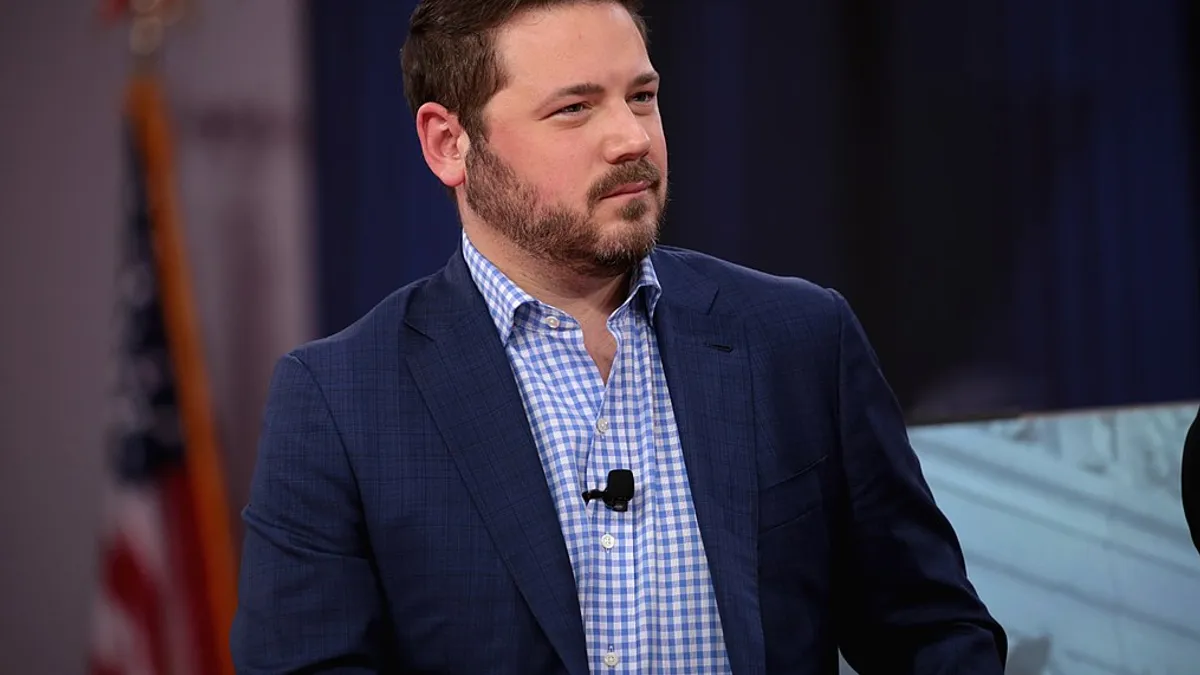UPDATE: May 23, 2022: The U.S. Circuit Court of Appeals for the 3rd Circuit issued a decision May 20 granting FDRLST Media's petition for review of the National Labor Relations Board's order that a tweet from Co-founder and Publisher Ben Domenech violated the National Labor Relations Act. The court also denied NLRB's cross petition for enforcement (FDRLST Media v. NLRB, No. 20-3434 (3rd Cir. May 20, 2022)).
"Here, the Board spent its resources investigating an online media company with seven employees because of a facetious and sarcastic tweet by the company’s executive officer," the 3rd Circuit said. "Because the Board lost the forest for the trees by failing to consider the tweet in context, it misconstrued a facetious remark as a true threat."
Dive Brief:
- A three-member panel of the National Labor Relations Board (NLRB) affirmed Nov. 24 an agency judge's ruling that FDRLST Media, operator of news website The Federalist, violated the National Labor Relations Act (NLRA) when the site's co-founder and publisher Ben Domenech posted a tweet threatening employees who attempted to unionize.
- In July 2019, Domenech wrote: "FYI @fdrlst first one of you tries to unionize I swear I'll send you back to the salt mine." Per NLRB, counsel for FDRLST argued that NRLB's General Counsel failed to establish that Domenech spoke on the company's behalf when tweeting from his personal account and that a reasonable employee "would not take Domenech's tweet as a threat of reprisal with loss of employment or other benefits." But the judge stated in part that "the tweet is reasonably considered as a threat because it tends to interfere with the free exercise of employee rights."
- "Accordingly, we adopt the judge's finding that the Respondent threatened employees with unspecified exceptions and reprisals if they engaged in union activity," NLRB said. The agency ordered FDRLST to cease and desist "[t]hreatening employees with unspecified reprisals if they engage in protected union activity." FDRLST did not immediately respond to an HR Dive request for comment.
Dive Insight:
In footnotes, NLRB noted that the respondent's motive for its conduct, as well as its subjective interpretations of that conduct, "are irrelevant to determining" whether the respondent violated Section 8(a)(1) of the NLRA, which makes it illegal for employers "to interfere with, restrain, or coerce employees in the exercise" of their rights under the law.
That is notable due to FDRLST's inclusion of two affidavits from employees, "both stating that the tweet was funny and sarcastic and neither one felt that the expression was a threat of reprisal," according to the judge's ruling. Domenech, in a separate affidavit, "maintained that the tweet was a satire and an expression of his personal viewpoint on a contemporary topic of general interest."
But the judge noted that "a threat is assessed in the context in which it is made and whether it tends to coerce a reasonable employee," and that "threats allegedly made in a joking manner also violate the Act."
"In viewing the totality of the circumstances surrounding the tweet, this tweet had no other purpose except to threaten the FDRLST employees with unspecified reprisal, as the underlying meaning of 'salt mine' so signifies," the judge said.
The decision was handed down months after a similar NLRB case involving Twitter remarks by Dave Portnoy, founder of media outlet Barstool Sports. In January, Barstool reached a settlement with the Board that included deletion of the tweets in question, Bloomberg Law reported. In September 2019, an NLRB judge held that Tesla CEO Elon Musk violated Section 8(a)(1) when he posted a tweet that suggested Tesla employees who voted to unionize would lose their company stock options.
Social media also has implications for employers when employees use platforms like Twitter and Facebook to engage in protected concerted activity, sources previously told HR Dive. Recent NLRB decisions indicate that the definition of "protected speech" extends to such platforms; in 2017, the Board held that an employee engaged in protected activity when he called his manager a vulgar term in a Facebook post discussing upcoming union elections.
This year, the Board also weighed in on protected activity on internal platforms. NLRB's general counsel issued in February an advice memorandum on a Google employee's complaint about the company's diversity policies, which "sought clarification from management about workplace rules, and protested the treatment of employees who hold unpopular viewpoints regarding the [e]mployer's workplace diversity initiatives," per the memorandum. Despite the observation that some of the worker's comments were "somewhat insensitive towards women and minorities in light of the conversation's context," according to NLRB, "no employer would reasonably believe that permitting such comments could lead to a hostile work environment."













